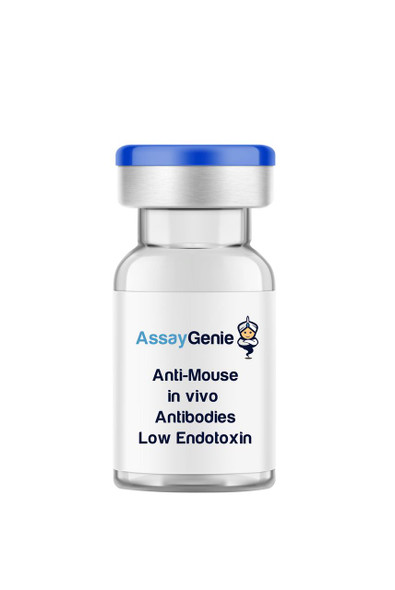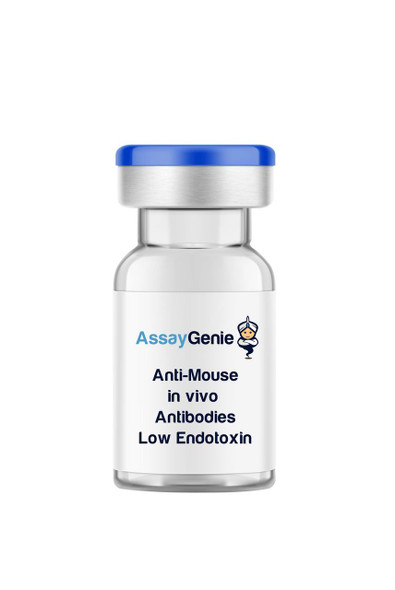Anti-Mouse CD32/CD16 In Vivo Antibody - Low Endotoxin (IVMB0027)
- SKU:
- IVMB0027
- Antibody Type:
- Functional-Grade In Vivo Antibody
- Applications:
- In Vivo
- Disease Area:
- Cancer
- Clone:
- 2.4G2
- Protein:
- CD32/CD16
- Isotype:
- Rat IgG2b
- Reactivity:
- Mouse
- Synonyms:
- Fc-gamma R III/II
- Ly-17
- Research Area:
- MHC & Immune Cell-Specific
- Endotoxin Level:
- Low Endotoxin
- Host Species:
- Rat
- Blocking
- CODEX
- FA
- FC
- IHC FF
- IP
- WB
Description
system_update_altTechnical Datasheet
| Product Name: | Anti-Mouse CD32/CD16 In Vivo Antibody - Low Endotoxin |
| Product Code: | IVMB0027 |
| Size: | 1mg, 5mg, 25mg, 50mg, 100mg |
| Clone: | 2.4G2 |
| Protein: | CD32/CD16 |
| Product Type: | Monoclonal Antibody |
| Synonyms: | Fcγ R III/II, Ly-17 |
| Isotype: | Rat IgG2b |
| Reactivity: | Mouse |
| Immunogen: | Sorted pre-B cells |
| Applications: | B, FA, FC, IHC FF, IP, PhenoCycler®, WB |
| Formulation: | This monoclonal antibody is aseptically packaged and formulated in 0.01 M phosphate buffered saline (150 mM NaCl) PBS pH 7.2 - 7.4 with no carrier protein, potassium, calcium or preservatives added. |
| Endotoxin Level: | < 1.0 EU/mg as determined by the LAL method |
| Purity: | ≥95% monomer by analytical SEC >95% by SDS Page |
| Preparation: | Functional grade preclinical antibodies are manufactured in an animal free facility using only In vitro protein free cell culture techniques and are purified by a multi-step process including the use of protein A or G to assure extremely low levels of endotoxins, leachable protein A or aggregates. |
| Storage and Handling: | Functional grade preclinical antibodies may be stored sterile as received at 2-8°C for up to one month. For longer term storage, aseptically aliquot in working volumes without diluting and store at -80°C. Avoid Repeated Freeze Thaw Cycles. |
| Applications: | B, CODEX®, FA, FC, IHC FF, IP, WB |
| Recommended Usage: | FC The suggested concentration for this 2.4G2 antibody for staining cells in flow cytometry is ≤ 1 µg per 106 in a volume of 100 µl. Titration of the reagent is recommended for optimal performance for each application. WB The suggested concentration for this 2.4G2 antibody for use in western blotting is 1-10 µg/ml. |
| Reactivity: | Mouse |
| Host Species: | Rat |
| Specificity: | Clone 2.4G2 recognizes the FcγIII and FcγII receptors. |
| Antigen Distribution: | These receptors are present on B cells, monocyte/macrophages, NK cells, neutrophils, mast cells and dendritic cells. |
| Immunogen: | Sorted pre-B cells |
| Concentration: | ≥ 5.0 mg/ml |
| Endotoxin Level: | < 1.0 EU/mg as determined by the LAL method |
| Purity: | ≥95% monomer by analytical SEC >95% by SDS Page |
| Formulation: | This monoclonal antibody is aseptically packaged and formulated in 0.01 M phosphate buffered saline (150 mM NaCl) PBS pH 7.2 - 7.4 with no carrier protein, potassium, calcium or preservatives added. |
| Preparation: | Functional grade preclinical antibodies are manufactured in an animal free facility using only In vitro protein free cell culture techniques and are purified by a multi-step process including the use of protein A or G to assure extremely low levels of endotoxins, leachable protein A or aggregates. |
| Storage and Handling: | Functional grade preclinical antibodies may be stored sterile as received at 2-8°C for up to one month. For longer term storage, aseptically aliquot in working volumes without diluting and store at -80°C. Avoid Repeated Freeze Thaw Cycles. |
CD16 is expressed in two forms: CD16a and CD16b. CD16a (FcγRIIIA) is a 50-65 kD polypeptide-anchored transmembrane protein. CD16b (FcγRIIIB) is a 48 kD GPI-anchored protein whose extracellular domain is over 95% homologous to that of CD16a. CD16 regulates both phagocytosis and antibody-dependent cell-mediated cytotoxicity. It has been reported that CD16 is involved in Natural Killer Cell activation and plays a role in signal transduction. The receptors, CD32 (FcγRIII) and CD16 (FcγRII), are 40-60 kD and bind antibody-antigen immune complexes and mediate adaptive immune responses.
| Technical Datasheet: | View |
| Protein: | CD32/CD16 |
| Function: | Low affinity receptors for IgG |
| Ligand/Receptor: | IgG |
| Research Area: | Immunology, Innate Immunity |
Meet the team!
Shane Costigan
Territory Manager & Team Lead
Abdul Khadim
Sales Executive




![Anti-Human CD16 [3G8] In Vivo Antibody - Low Endotoxin Anti-Human CD16 [3G8] In Vivo Antibody - Low Endotoxin](https://cdn11.bigcommerce.com/s-h68l9z2lnx/images/stencil/590x590/products/214447/569382/anti-human-cd16-3g8-in-vivo-antibody-low-endotoxin__18619.1673496666.jpg?c=2)


